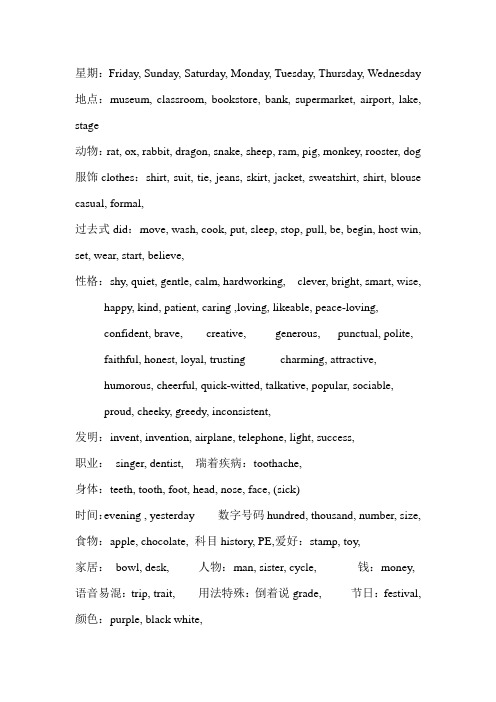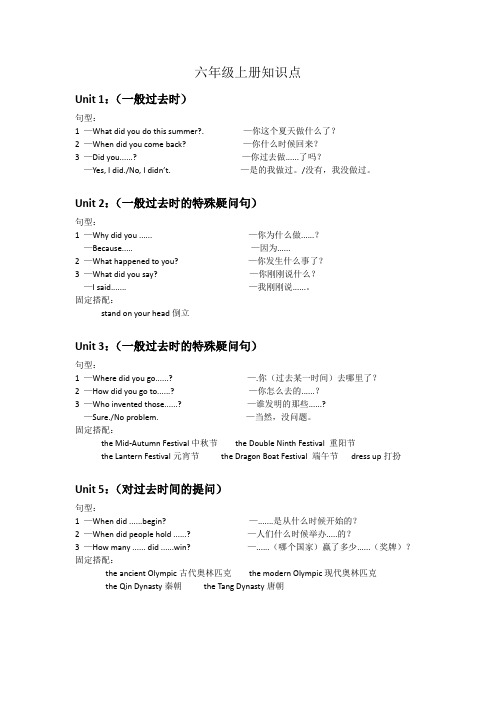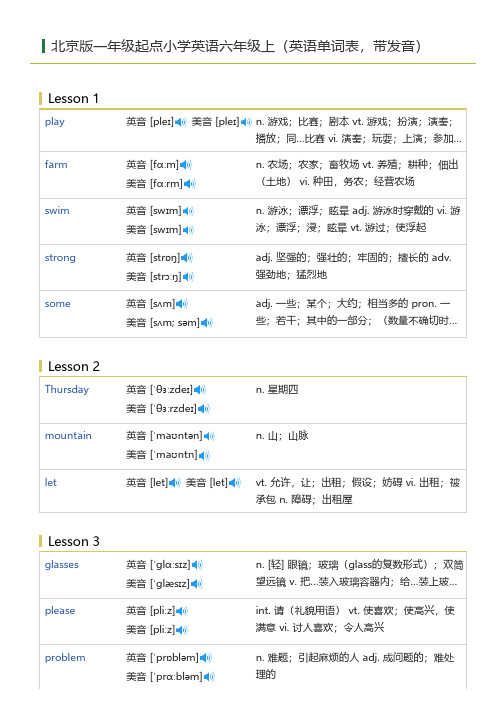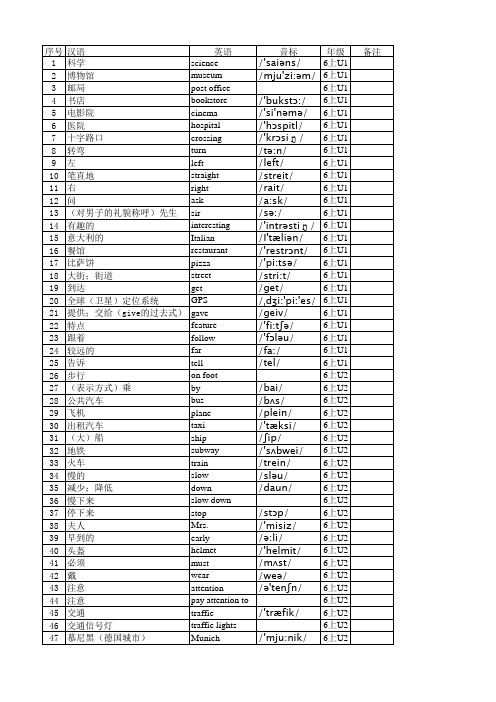北京版 六上 第一课单词及过去式
六年级上北京版知识点

Lesson 1一、动词及过去式look-looked learn-learned work-worked read-readstay-stayed play-played go-went write-wrotedo-did visit-visited have/has-had make-made二、重点词组went back to Canada回加拿大了 had a great time过的愉快did many things做了许多事情 visited my grandparents看望我爷爷奶奶played with my friends 和我的朋友玩 just stayed in Beijing待在北京Worked on my uncle’s farm在我叔叔的农场劳动 went swimming去游泳learned to sing Peking Opera学唱京剧visited some museums参观一些博物馆played with my cousins和我的堂兄弟姐妹玩had an interesting vacation度过了一个有意思的假期三、重点句型What did you do this summer?I went back to Canada.What did Lanlan do this summer?She wrote a story.What did Qiangqiang do this summer?He made cakes.四、我会说I went to Niantan park .I had a great time ,and did many things.I went to the beach. I played with my friends .I had an interesting vacation.Lesson 2一、动词及过去式不规则:(1)do—did (2)e—came (3)swim—swam (4)go—went(5)catch—caught(6)let—let (7)am/is—was (8)are—were(9)take—took (10)have/has—had规则:(1)climb—climbed二、重点词组(1)e back (2)summer camp (3)last Thursday (4)climbed themountains回来夏令营上周四爬山(5)swam in the river (6)went fishing (7)caught three fish在河里游泳去钓鱼抓了三条鱼(8)good for you (9)had a lot of fun你真好过的非常快乐三、重点句型When did you e back? When did she finish the piano lesson?I came back last Thursday. She finished piano lessons last week.When did he go to the airport?He went to the airport last Monday morning.四、我会说My parents and I took a trip last weekend..I flew to Hangzhou. We went there by airWe visited many places and saw green hills, blue water, small bridges, and old houses.We came back last weekend.Today I was happy.Today we had a lot of fun.Lesson 31.动词及过去式do—didbuy—boughtgive—gavelike—liked2.重点句型Did you go to see your grandparents?Yes, I did./No, I didn’t.Did you return the books?Yes, I did./No, I didn’t.Did they win the football match?Yes, I did./No, I didn’t.3 .重点词组a pair of Chinese shoes a pair of glassesSure, what can I do for you? No problem.4.我会说My parent and I went to Xiangshan by car last weekend. We saw a lot of colourful leaves on the hills. We walked around and took many photos. We stayed there for three hours and went back home.Lesson5一、重点单词wrong aches terribly practice kung fu有问题的疼很非常练习功夫Interested lucky dangerous X-ray neck对…感兴趣幸运危险的 X-射线脖子二、动词及其过去式happen-happened stand-stood do-did want-wanted 发生站立做想要think-thought is-was hurt-hurt don‘t-didn’t认为,想是受伤没有,不是isn’t -wasn’t不是三、重点词组My neck aches terribly practice kung fu be interested in 脖子疼的厉害练习中国功夫对----感兴趣四、重点句子1. What’s wrong with you? 你怎么了?2. What’s happened to your neck? 你的脖子怎么了?3. I’m very interested in it. 我对这个非常感兴趣。
北京版小学六年级上学期词汇

星期:Friday, Sunday, Saturday, Monday, Tuesday, Thursday, Wednesday 地点:museum, classroom, bookstore, bank, supermarket, airport, lake, stage动物:rat, ox, rabbit, dragon, snake, sheep, ram, pig, monkey, rooster, dog 服饰clothes:shirt, suit, tie, jeans, skirt, jacket, sweatshirt, shirt, blouse casual, formal,过去式did:move, wash, cook, put, sleep, stop, pull, be, begin, host win, set, wear, start, believe,性格:shy, quiet, gentle, calm, hardworking, clever, bright, smart, wise, happy, kind, patient, caring ,loving, likeable, peace-loving,confident, brave, creative, generous, punctual, polite,faithful, honest, loyal, trusting charming, attractive,humorous, cheerful, quick-witted, talkative, popular, sociable,proud, cheeky, greedy, inconsistent,发明:invent, invention, airplane, telephone, light, success,职业:singer, dentist, 瑞着疾病:toothache,身体:teeth, tooth, foot, head, nose, face, (sick)时间:evening , yesterday 数字号码hundred, thousand, number, size, 食物:apple, chocolate, 科目history, PE,爱好:stamp, toy,家居:bowl, desk, 人物:man, sister, cycle, 钱:money, 语音易混:trip, trait, 用法特殊:倒着说grade, 节日:festival, 颜色:purple, black white,副词:along, around, early, tonight, ago,形容词:易混淆last, late, 反义词ancient, modern,词性易错crowded, 质地silk, such, easy, tall, own,其它(注意用法和固定用法):myself, off, OK,,。
北京版六年级英语上册第一单元知识点总结

UNIT1知识点总结I just stayed in Beijing.我只是待在了北京。
I learned to sing Peking Opera and went swimming.我学习了唱京剧,还去游泳了。
I visited some museums and played with my cousins.我参观了一些博物馆,还和我的表哥表姐一起玩耍。
LESSON2I went to my summer camp.我去夏令营了。
I came back last Thursday.我上周四回来的。
I climbed the mountains and swam in the river.我爬山了,还在河里游泳了。
I went fishing and caught three fish.我去钓鱼了,还钓上了三条鱼。
I let them go back into the river again.我让它们又回到小河里了。
I had a lot of fun.我玩得很开心。
I had a great time.我玩得很开心。
I had an interesting vacation.我度过了一个有意思的假期。
LESSON3I went to see my grandparents.我去看望了我的爷爷奶奶。
I gave them some gifts.我送了他们一些礼物。
I bought a pair of shoes for my grandma.我给我的奶奶买了一双鞋。
I bought a pair of glasses for my grandpa.我给我的爷爷买了一副眼镜。
They liked them very much.他们非常喜欢。
They are coming to visit me next summer.他们明年夏天将要来北京看望我。
I want them to enjoy the best food here.我想要他们享用这里最好的美食。
北京小学英语知识点总结6年级上册

六年级上册知识点Unit 1:(一般过去时)句型:1 —What did you do this summer?. —你这个夏天做什么了?2 —When did you come back? —你什么时候回来?3 —Did you......? —你过去做......了吗?—Yes, I did./No, I didn’t. —是的我做过。
/没有,我没做过。
Unit 2:(一般过去时的特殊疑问句)句型:1 —Why did you ...... —你为什么做......?—Because..... —因为......2 —What happened to you? —你发生什么事了?3 —What did you say? —你刚刚说什么?—I said....... —我刚刚说......。
固定搭配:stand on your head倒立Unit 3:(一般过去时的特殊疑问句)句型:1 —Where did you go......? —.你(过去某一时间)去哪里了?2 —How did you go to......? —你怎么去的......?3 —Who invented those......? —谁发明的那些......?—Sure./No problem. —当然,没问题。
固定搭配:the Mid-Autumn Festival中秋节the Double Ninth Festival 重阳节the Lantern Festival元宵节the Dragon Boat Festival 端午节dress up打扮Unit 5:(对过去时间的提问)句型:1 —When did ......begin? —.......是从什么时候开始的?2 —When did people hold ......? —人们什么时候举办.....的?3 —How many ...... did ......win? —......(哪个国家)赢了多少......(奖牌)?固定搭配:the ancient Olympic古代奥林匹克the modern Olympic现代奥林匹克the Qin Dynasty秦朝the Tang Dynasty唐朝Unit 6:(穿戴)句型:1 —What is he wearing? —他穿了什么?—He is wearing ........... —他穿的是......2 —.What does he wear .....? —他在....(什么场合)穿什么?—He wears....... —他穿......。
北京版一年级起点小学英语六年级上(英语单词表)

北京版一年级起点小学英语六年级上(英语单词表,带发音)Lesson 1Lesson 2Lesson 3play英音 [ple ɪ]美音 [ple ɪ]n. 游戏;比赛;剧本 vt. 游戏;扮演;演奏;播放;同…比赛 vi. 演奏;玩耍;上演;参加…farm英音 [fɑːm]美音 [fɑːrm]n. 农场;农家;畜牧场 vt. 养殖;耕种;佃出(土地) vi. 种田,务农;经营农场swim英音 [sw ɪm]美音 [sw ɪm]n. 游泳;漂浮;眩晕 adj. 游泳时穿戴的 vi. 游泳;漂浮;浸;眩晕 vt. 游过;使浮起strong英音 [str ɒŋ]美音 [str ɔːŋ]adj. 坚强的;强壮的;牢固的;擅长的 adv.强劲地;猛烈地some英音 [s ʌm]美音 [s ʌm; s əm]adj. 一些;某个;大约;相当多的 pron. 一些;若干;其中的一部分;(数量不确切时…Thursday英音 [ˈθɜːzde ɪ]美音 [ˈθɜːrzde ɪ]n. 星期四mountain英音 [ˈma ʊnt ən]美音 [ˈma ʊntn]n. 山;山脉let英音 [let]美音 [let]vt. 允许,让;出租;假设;妨碍 vi. 出租;被承包 n. 障碍;出租屋glasses英音 [ˈɡlɑːs ɪz]美音 [ˈɡlæs ɪz]n. [轻] 眼镜;玻璃(glass的复数形式);双筒望远镜 v. 把…装入玻璃容器内;给…装上玻…please英音 [pli ːz]美音 [pli ːz]int. 请(礼貌用语) vt. 使喜欢;使高兴,使满意 vi. 讨人喜欢;令人高兴problem英音 [ˈpr ɒbl əm]美音 [ˈprɑːbl əm]n. 难题;引起麻烦的人 adj. 成问题的;难处理的Lesson 5Lesson 6Lesson 7Lesson 9young英音 [j ʌŋ]美音 [j ʌŋ]n. 年轻人;(动物的)崽,仔 adj. 年轻的;初期的;没有经验的neck英音 [nek]美音 [nek]n. 脖子;衣领;海峡 vi. 搂著脖子亲吻;变狭窄 vt. 使变细;与…搂著脖子亲吻but英音 [b ət]美音 [b ət; b ʌt]conj. 但是;而是;然而 adv. 仅仅,只 prep.除…以外football英音 [ˈf ʊtb ɔːl]美音 [ˈf ʊtb ɔːl]n. 足球,橄榄球 vi. 踢足球;打橄榄球match英音 [mæt ʃ]美音 [mæt ʃ]vt. 使比赛;使相配;敌得过,比得上;相配;与…竞争 vi. 比赛;匹配;相配,相称;相比…myself英音 [ma ɪˈself]美音 [ma ɪˈself]pron. 我自己;我亲自;我的正常的健康状况和正常情绪cry英音 [kra ɪ]美音 [kra ɪ]n. 叫喊;叫声;口号;呼叫 vi. 哭;叫;喊 vt.叫喊;哭出;大声说lunch英音 [l ʌnt ʃ]美音 [l ʌnt ʃ]n. 午餐 vt. 吃午餐;供给午餐 vi. 吃午餐;供给午餐chocolate英音 [ˈt ʃɒkl ət]美音 [ˈt ʃɔːkl ət]n. 巧克力,巧克力糖;巧克力色 adj. 巧克力色的;巧克力口味的supper英音 [ˈs ʌp ə(r)]美音 [ˈs ʌp ər]n. 晚餐,晚饭;夜宵see 英音 [si ː]美音 [si ː]vi. 看;看见;领会 vt. 看见;理解;领会Monday英音 [ˈm ʌnde ɪ]n. 星期一Lesson 10 Lesson 11 Lesson 15美音 [ˈmʌndeɪ]hotel英音 [həʊˈtel]美音 [hoʊˈtel]n. 旅馆,饭店;客栈 vt. 使…在饭店下榻 vi. 进行旅馆式办公angry英音 [ˈæŋɡri]美音 [ˈæŋɡri]adj. 生气的;愤怒的;狂暴的;(伤口等)发炎的hill英音 [hɪl]美音 [hɪl]n. 小山;丘陵;斜坡;山冈west 英音 [west]美音 [west]n. 西;西方;西部 adj. 西方的;朝西的 adv.在西方;向西方;自西方around英音 [əˈraʊnd]美音 [əˈraʊnd]prep. 四处;在…周围 adv. 大约;到处;在附近many英音 [ˈmeni]美音 [ˈmeni]pron. 许多;许多人 adj. 许多的ride英音 [raɪd]美音 [raɪd]n. 骑;乘坐;交通工具;可供骑行的路;(乘坐汽车等的)旅行;乘骑;(乘车或骑车的…horse英音 [hɔːs]美音 [hɔːrs]n. 马;骑兵;脚架;海洛因 vt. 使骑马;系马于;捉弄 vi. 骑马;作弄人smart英音 [smɑːt]美音 [smɑːrt]adj. 聪明的;巧妙的;敏捷的;厉害的;潇洒的;剧烈的;时髦的PE英音 [peɪ]美音 [peɪ]abbr. 体育课,体能训练(physicaleducation)history英音 [ˈhɪst(ə)ri]美音 [ˈhɪstri]n. 历史,历史学;历史记录;来历those英音 [ðəʊz]adj. 那些的 pron. 那些(that的复数)Lesson 16 Lesson 17 Lesson 19 Lesson 20美音 [ðoʊz]modern英音 [ˈmɒdn]美音 [ˈmɑːdərn]adj. 现代的,近代的;时髦的 n. 现代人;有思想的人stop英音 [stɒp]美音 [stɑːp]n. 停止;车站;障碍;逗留 vi. 停止;中止;逗留;被塞住 vt. 停止;堵塞;断绝ago英音 [əˈɡəʊ]美音 [əˈɡoʊ]adj. 以前的;过去的 adv. 以前,以往hold英音 [həʊld]美音 [hoʊld]n. 控制;保留 vi. 支持;有效;持续 vt. 持有;拥有;保存;拘留;约束或控制 又作…take part in na. 参加;贡献number英音 [ˈnʌmbə(r)]美音 [ˈnʌmbər]n. 数;(杂志等的)期;号码;数字;算术vi. 计入;总数达到 vt. 编号;计入;数…的…visitor英音 [ˈvɪzɪtə(r)]美音 [ˈvɪzɪtər]n. 访问者,参观者;视察者;候鸟world英音 [wɜːld]美音 [wɜːrld]n. 世界;领域;世俗;全人类;物质生活tie英音 [taɪ]美音 [taɪ]n. 领带;平局;鞋带;领结;不分胜负 vi. 打结;不分胜负;被用带(或绳子等)系住 vt.…Mr英音 [ˈmɪstə(r)]美音 [ˈmɪstər]abbr. 先生(Mister)goodbye英音 [ˌɡʊdˈbaɪ]美音 [ˌɡʊdˈbaɪ]int. 再见 放弃 告别Lesson 21Lesson 23singer 英音 [ˈs ɪŋə(r)]美音 [ˈs ɪŋər]n. 歌手,歌唱家stage 英音 [ste ɪd ʒ]美音 [ste ɪd ʒ]n. 阶段;舞台;戏剧;驿站 vt. 举行;上演;筹划 vi. 举行;适于上演;乘驿车旅行dress 英音 [dres]美音 [dres]n. 连衣裙;女装 vt. 给…穿衣 vi. 穿衣sing 英音 [s ɪŋ]美音 [s ɪŋ]n. 演唱;鸣声;呼啸声 vt. 唱;用诗赞颂;唱着使 vi. 唱歌;歌颂;鸣叫;呼号like英音 [la ɪk]美音 [la ɪk]vt. 喜欢;想;愿意 vi. 喜欢;希望 prep. 像;如同 adj. 同样的;相似的 n. 爱好;同样的…colour英音 [ˈk ʌl ə(r)]美音 [ˈk ʌl ər]n. 颜色;风格;气色,面色;外貌 vt. 把…涂颜色,粉饰;歪曲;使脸红 vi. 变色clothes英音 [kl əʊðz]美音 [klo ʊðz; klo ʊz]n. 衣服hobby英音 [ˈh ɒbi]美音 [ˈhɑːbi]n. 嗜好;业余爱好tiger英音 [ˈta ɪɡə(r)]美音 [ˈta ɪɡər]n. 老虎;凶暴的人twelve英音 [twelv]美音 [twelv]num. 十二;十二个 n. 十二;十二个 adj. 十二的;十二个的animal英音 [ˈæn ɪm(ə)l]美音 [ˈæn ɪm(ə)l]n. 动物 动物的rat 英音 [ræt]美音 [ræt]n. 鼠;卑鄙小人,叛徒 vi. 捕鼠;背叛,告密rabbit英音 [ˈræb ɪt]美音 [ˈræb ɪt]n. 兔子,野兔 vt. 让…见鬼去吧 vi. 猎兔Lesson 24Lesson 25decide英音 [d ɪˈsa ɪd]美音 [d ɪˈsa ɪd]vi. 决定,下决心 vt. 决定;解决;判决order英音 [ˈɔːd ə(r)]美音 [ˈɔːrd ər]n. 命令;顺序;规则;[贸易] 定单 vt. 命令;整理;定购 vi. 命令;定货choose英音 [t ʃu ːz]美音 [t ʃu ːz]vt. 选择,决定 vi. 选择,挑选start英音 [stɑːt]美音 [stɑːrt]n. 开始;起点 vt. 开始;启动 vi. 出发stamp英音 [stæmp]美音 [stæmp]n. 邮票;印记;标志;跺脚 vt. 铭记;标出;盖章于…;贴邮票于…;用脚踩踏 vi. 跺脚;…collect英音 [k əˈlekt]美音 [k əˈlekt]vt. 收集;募捐 adj. 由收件人付款的 vi. 收集;聚集;募捐 adv. 由收件人付款地show英音 [ʃəʊ]美音 [ʃo ʊ]n. 显示;表演;炫耀 vt. 显示;说明;演出;展出 vi. 显示;说明;指示ox 英音 [ɒks]美音 [ɑːks]n. 牛;公牛worker英音 [ˈw ɜːk ə(r)]美音 [ˈw ɜːrk ər]n. 工人;劳动者;职蚁。
北京市人教版英语单词表-六年级上册

6上U4
96 工厂 97 工人 98 邮递员 99 商人;企业家 100 警察 101 渔民 102 科学家 103 飞行员 104 教练 105 国家 106 校长 107 大海 108 保持 109 大学 110 体育馆 111 如果 112 记者 113 使用 114 打字 115 迅速地 116 秘书 117 生气的 118 害怕 119 难过的 120 担心的;发愁的 121 高兴的 122 看病 123 穿 124 更多的 125 深的 126 呼吸 127 深深吸一口气 128 数数 129 数到十 130 追赶 131 老鼠(mouse的复数) 132 邪恶的;坏的 133 (使)受伤 134 有病;不舒服 135 有毛病 136 应该 137 觉得;感到 138 健康;身体好 139 坐 140 草坪 141 听见 142 蚂蚁 143 担心;担忧
/'sʌbwei/ 6上U2
33 火车
train
/trein/
6上U2
34 慢的
slow
/sləu/
6上U2
35 减少;降低
down
/daun/
6上U2
36 慢下来
slow down
6上U2
37 停下来
stop
/stɔp/
6上U2
38 夫人
Mrs.
/'misiz/
6上U2
39 早到的
early
/ə:li/
/'wʌrid/
6上U6
/'hæ pi/
6上U6
6上U6
/weə/
6上U6
/mɔ:/
6上U6
/di:p/
6上U6
/breθ/
北京版小学六年级英语(上册)知识点全表
词汇:交通工具词汇;动词过去式(规则和不规则变化)
句型:
G5U2
What did you do yesterday?
I watched TV.
G4U10
How do you go to school?
I go by bus.
词汇:miss(错过),flight, passport, hotel, fantastic, silk, subway,bridge, sound, special,the Spring Festival Fair, invent, vehicles, smart,invention
What did you say?
I said you should stop eating too much.
stand on your head, practicekung fu, cry, fell down, go to hospital, cut finger, hurt, broke, scratched, eating too much, playing computer games, smoking
Unit 6
What is he wearing?
Clothes
Talking about people’s wearing
What is he wearing?
He is wearing a blue suit with a silver tie.
What does she wear on stage?
句型:
Who invented those vehicles?
Some smart people did.
本单元话题非常贴近学生生活实际,鼓励学生进行真实的表达与交流。
北京版小学英语六年级上单词表
go to see your grandparents去看你的爷爷奶奶,a pair of Chinese shoes一双中国鞋,a pair of glasses一副眼镜,next summer明年夏天,No problem没问题,return the books还书,win the football match赢了足球赛
How many medals did Chineseathleteswin?中国运动员赢得了多少块奖牌?
They won 51 gold medals, 21 silver medals, and 28 bronze medals.他们赢得了51块金牌,21块银牌和28块铜牌。
win---won buy---bought
can---could
L 17
host the 29thOlympic Games主办第29届奥运会,such a great success如此大的成功,athlete运动员,medal奖牌, gold medals金牌, silver medals银牌, bronze medals铜牌,on the gold medal table在金牌榜上,such a big sports festival如此大的体育盛会,beproud of感到骄傲,visitor访问者,来客, all over the world世界各地, buy three shirts买3件衬衫, borrow six books借6本书
change to the subway换乘地铁, the Spring Festival Fair春节庙会,by subway坐地铁,by taxi坐出租车,by train坐火车,on foot步行
How did youget to Hangzhou?你怎么去的杭州?
北京课改版六年级英语上册 Unit 1 What did you do this summer 知识清单
Unit 1 What did you do this summer?一、核心词汇1. 名词: farm 农场Thursday 星期四mountain 山,山脉glasses 眼镜problem 问题2. 动词: play 玩swim 游泳let 让,允许3. 形容词: strong 健壮的,强健的4. 限定词: some 一些5. 感叹词: please 请二、拓展词汇1. 名词: airport 飞机场vacation 假期camp(夏令)营,营地gift 礼物fun 乐趣weekend 周末fox 狐狸machine 机器ox 牛,公牛Xerox复印机2. 动词: write 写return 归还visit 访问,拜访learn 学,学习;学会catch抓住fish 钓鱼miss 思念,想念enjoy 享受……乐趣;喜欢win 获胜;赢得比赛carry 拿,搬,带3. 形容词: interesting 有趣的,有意思的best 最好的4. 副词: also 也,同样first 第一;首次5. 代词: both 二者,两者都6. 介词: into进入, 到……中during 在……期间;在……过程中7. 短语: go back to 回去have a great time 玩得开心,过得愉快no wonder 难怪,怪不得come back from 从……回来one day 一天good for you 你真好 a lot of 许多,大量buy… for 给……买…… a pair of 一双;一条;一副三、核心句型1. — What did you do this summer? 你今年夏天干什么了?— Oh, I went back to Canada. 噢,我回加拿大了。
解读:这是询问某人做过什么的句型及其回答,是 what 引导的一般过去时的特殊疑问句。
举一反三: — What did you do last Thursday? 你上星期四做什么了?— I played football. 我踢足球了。
六年级英语上册 第一单元 动词过去式构成规则 北京版
一、动词过去式构成变化规律1.一般情况下,词尾加–ed, 如:work –worked; play –played; want –wanted;2.以不发音的 -e 结尾的词,词尾加 -d, 如:like –liked; live –lived;3.以辅音字母 + y结尾的词,把-y变为-i 再加-ed, 如:study –studied; cry –cried; carry –carried;4.以一个元音+一个辅音字母结尾的重读闭音节动词,双写词尾字母, 再加 -ed, 如:stop –stopped5.以一个元音+l结尾的词, 英式英语双写l加-ed, 美式英语直接加-ed, 如:travelled(英)/traveled(美)6.不规则动词的过去式变化需强加记忆(见下方表格)二、动词过去式读音变化规律1.在浊辅音后读/d/: lived, moved, listened…2.在清辅音后读/t/: liked, watched…3.在/t/、/d/音后读/id/: wanted, started…Sit-satSing-sangGive-gaveDrink-drankBegin-beganSet-setPut-putLet-letHurt-hurtRead /i:/-read /e/Know-knewHold-heldGrow-grewWrite-wroteRide-rodeDrive-droveWill-wouldShall-shouldCan-couldSleep-sleptKeep-keptSpend-spentSend-sentTell-toldSell-soldThink-thoughtBuy-boughtTeach-taught Catch-caughtMeet-metFeed-fedBreak-brokeCome-cameBecome-became其余:Do-didGet-gotTake-tookAm/is-wasAre-wereLose-lostLeave-leftFeel-feltLearn-learnt/learned Make-madeHave-hadRun-ranWear-woreSee-sawSay-saidDraw-drewFly-flewHear-heardFind-foundGo-went。
